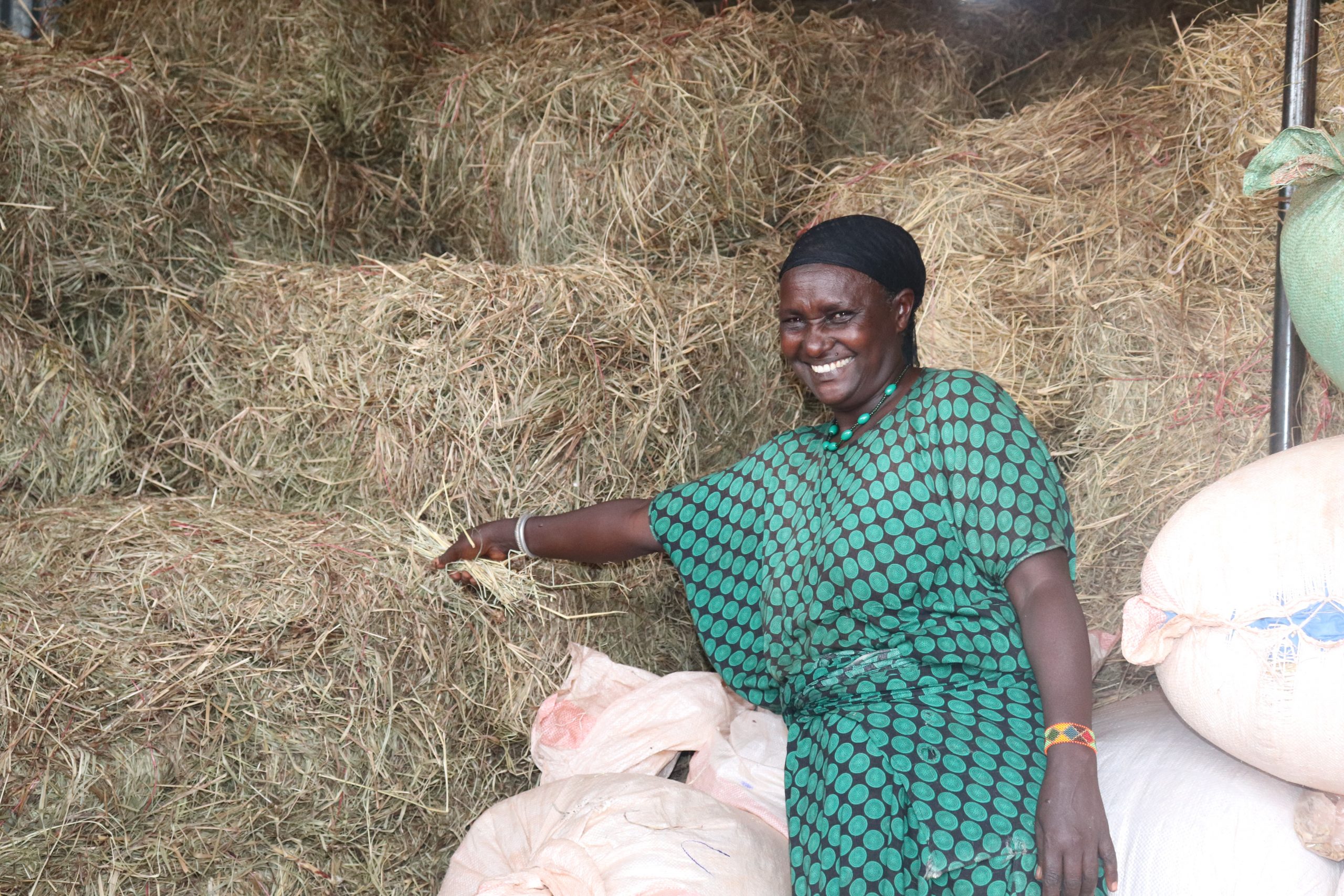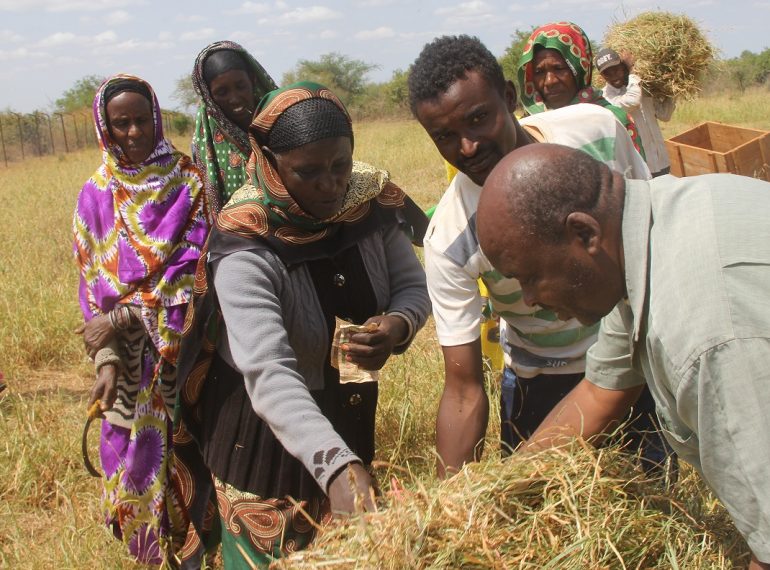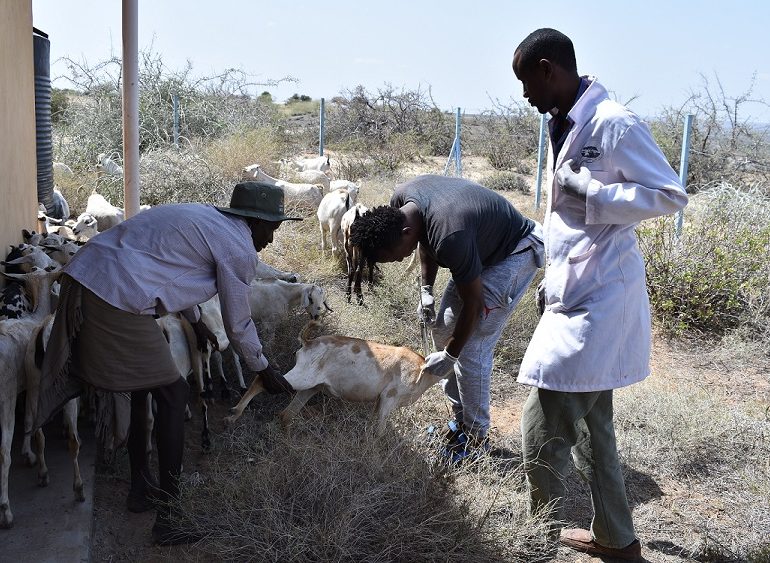
After five consecutive failed rainy seasons, Kenya experienced heavy rains that brought devastating floods between October and December 2023. Damage to agriculture, livestock, and disruption of infrastructure increased food insecurity in affected counties which, according to the latest Integrate Phase Classification analysis, was already estimated to affect 2.8 million people in the ASAL regions. Out of those facing high levels of Acute Food Insecurity 2.3 million are classified in IPC Phase 3 - Crisis and nearly 500,000 are classified in IPC Phase 4 – Emergency. The situation has forced households to adopt various coping mechanisms as a mitigation measure for the food shortages. Limiting portion size at mealtimes, reducing the number of meals eaten in a day, and purchasing food items on credit were the most common coping mechanisms reported. Margaret is a 42-year-old mother of six and a hardworking resident of Gogoltim village in Samburu County. Samburu is an…

Cash Transfer-Bridging the food gap Kame Mamo Dido, is a 32-year-old widow and a mother of 5 children. Her youngest child is barely 9 months old. She comes from Bubisa ward and she is a beneficiary of the unconditional cash transfer supported by CBM. Kame was chosen by the community as she is partially deaf and has her safety net negatively affected by the drought. In recent years, she has been living harmoniously with her in-laws who have always been supporting her and her children after the death of her husband. They have been rearing goats and diligently sharing the proceeds from the sale to sustain their livelihoods. They have been living as neighbours and looking after each other’s welfare.They formed this cooperation to mitigate social and economic risks. Due to the prolonged drought, their goats have largely perished due to lack of water and pasture and the remaining few…

Thomas Edison, the great innovator behind the bulb, said: There’s a way to do it better. Find it! In its work with communities, PACIDA knew there had to be a better way to manage water usage. In a bid to improve water access through improved management practices, the Strengthening Community Resilience in Marsabit County (SCRMC), PACIDA received support from the Food for the Hungry Kenya (FH Kenya) with funding from USAID/OFDA introduced the first ever pre-paid communal water system in Marsabit County. The organisation identified four areas to benefit from this project: Shauri Yako and Saku in Marsabit Town. To date, two water kiosks have been installed with the pre-paid meters and the Kiosk at Saku is operational. This is how the technology works: 1. Every household in the targeted region is issued with a token (a small-chip powered gadget) by a Water Management Committee. 2. The user loads the…

Marsabit-Kenya: Seen as the worlds’ worst migratory pests, desert locust swarms descended in Marsabit, decimating crops and devouring grazing land, subsequently affecting the source of livelihoods in a community that depends on livestock for survival. Paulina, 52 years old and mother of six from Yomoo in Loiyangalani, knows too well the compounding effects of the desert locusts. “When the locusts came, they were flying all over, they landed on the grazing fields, feeding on the grass” says Paulina, adding that the locust infestation left nothing for her goats to feed on. The locust invaded her village earlier this year, around February 2020, just when they were recovering from the effects of floods that hit the region in the months of October and November of 2019. As the pastoralist communities in the region are recovering from the multiple threats, including the COVID-19 pandemic as well as recurrent climate-related shocks such as…

How Village Savings and Loans Concept is transforming businesses in Marsabit, Kenya Standing in front of her small mud retail-shop, Halima Adan, stares at her grandchildren play hide-and-seek, there are usually not many customers visiting her shop at this time of the day, so she takes time to engage with the kids. Life took a new turn for Halima, 50 years old-widow residing in Kinisa Village in the north eastern county of Marsabit, when she was given a business starter kit worth Ksh.15, 000 by Pastoralist Community Initiative and Development Assistance (PACIDA). She then took a loan of Ksh. 15,000 from Kinisa Village Savings and Loans Association (VSLA) to supplement her starter kit, and she started a provision shop. “Prior to venturing into the retail shop business, my only source of income was selling goat milk,” she says. “The income was hardly enough to buy food for the family, pay…

Jaldesa, Marsabit-Kenya: The front yard of Fatuma Molu’s home is a hive of activity. To the center left, green leafy kales sprout from a kitchen garden adjacent to a cows’ shed with mooing calves and a conspicuous silo-like structure with bales of fodder. At the bottom of a gentle slope beyond the compound lies a 10 acre fenced rangeland fodder- farm; visibly, a group of youth is preparing the land ready for another season of fodder planting. Fatuma, 55 years and a widow is the chairperson of Jaldesa Sauti Moja Group - a community-based organisation with 40 members (38 female and 2 male). The group has found passion in fodder farming and its members are now reaping the benefits of selling hay and grass-seeds. “We sell a bale of hay for Ksh 300 to non-members of the group and Ksh 250 to the members. Additionally, 1 Kg of grass-seeds goes…

“We expect to harvest 60 bales of hay per acre from the rehabilitated rangeland. We are reaping double benefit by selling a kilo of grass seeds at 1,000 Kenya Shillings (10 US Dollars) while a bale of hay weighing 8kg is sold at 300 Kenya Shillings,” says Fatuma, chairperson of Jaldesa Sauti Moja fodder production group from Badassa. Jaldesa Sauti Moja Women group at Badassa was identified and supported through training, capital, fencing materials and grass seeds. This is one of the most proactive fodder production groups in Marsabit County with 40 active members who are very passionate about fodder production. A total of 675 kilograms of grass seeds were distributed to 115 willing members from three different groups. The group has already started harvesting seeds and hay. Fodder is available for sale and use during stress period. “We harvest the grass and remove the seeds before we prepare them…

“My life has stabilized significantly since the cash support activity began. I have paid my debts and I am able to buy food and water form my family,” says Roba Wario (28) who is one of the beneficiaries of emergency cash transfer to vulnerable and drought-affected communities of Marsabit County of Kenya. Roba is a mother of three children. She was born in Bubisa Ward of Marsabit County, this is where she still lives. She does not have any formal job. Her children need food but she can only afford one meal a day for them. She has received a cash allocation of 3,000 Shillings (equivalent of about 30 US Dollars). “Without the cash support, we would be sleeping hungry,” she says. On this day, she has bought maize flour at 70 shillings (0.7 US dollar) and pasta at 70 shillings. She proceeded to prepare ugali, a local delicacy made…

A public forum on climate change and adaptation was recently held in Marsabit town bringing together various self-help groups, local and county authorities, religious groups and residents of Marsabit town. The event enabled various stakeholders in Marsabit County of Kenya to come together and discuss pertinent issues relating to drought and climate change adaptation. In attendance was Kisilu Musya a climate change activist and global campaigner on climate issues affecting farmers in Kenya and East Africa. “We are all actors in the climate adaptation struggle. Our little activities combined contribute immensely in determining the direction our climate will be taking affecting future generations,” Kisilu explained to the audience. East Africa is particularly vulnerable from the negative effects of climate change. In Kenya, northern counties of Marsabit, Mandera and Turkana lie in the arid zones which face increasingly dry conditions linked to rising temperatures and less rainfall. These conditions threaten the…

Local communities in northern Kenya are adapting to climate change through different approaches in order to mitigate its harmful effects demonstrated most visibly through frequent cycles of drought in East Africa. Along the border of Kenya and Ethiopia, communities of Dassanach are reshaping their adaptation strategy by embracing a unique breed of goats that is more resilient to the changing conditions. The Galla goat, a strong breed of goat has a reputation for surviving droughts thanks to its higher resistance to opportunistic diseases that eliminate ordinary goats due to weakening body immune system. Compared to ordinary goats living among the Dassanach communities of Kenya and Ethiopia, the Galla breed boasts higher yield of milk.Pastoralist Community Initiative and Development Assistance (PACIDA) has partnered with Kenya and Ethiopia governments through the livestock departments and Social Development Coordinating Office (SDCO) to provide communities of Dassanaach with 198 Galla goats. The aim of the…
Partners























